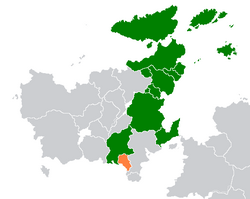Piraea–Euclean Community relations: Difference between revisions
| Line 19: | Line 19: | ||
The election of [[Konstantinos Kondoulis]] in 1993 was decisive in aligning Piraea with the Euclean Community, forming the first [[Anastas Pacts]] to open up the road for accession. In 1994, Kondulis signed with the [[Etruria]]m president, [[Nicolò Grassi]], a friendship pact between the two nations, recognising the Etrurian government in [[Tarpeia]] and granting Piraeans free movement along the portion of land; the agreement and solution of territorial disputes between the two nations carved the path to Piraea's early membership of [[ECDTO]] in 1996, following a referendum conducted a year before. In 2003, the country submitted its first {{wp|association agreement}} and a year later, it was granted the {{wp|candidate status}} after the Premier [[Stefanos Xanthos]] submitted the formal application. However, between 2005 and 2009, poor advances were made; Piraea made it a common goal among all political sectors in 2009 to join alongside [[Etruria]] and [[Emessa]]. | The election of [[Konstantinos Kondoulis]] in 1993 was decisive in aligning Piraea with the Euclean Community, forming the first [[Anastas Pacts]] to open up the road for accession. In 1994, Kondulis signed with the [[Etruria]]m president, [[Nicolò Grassi]], a friendship pact between the two nations, recognising the Etrurian government in [[Tarpeia]] and granting Piraeans free movement along the portion of land; the agreement and solution of territorial disputes between the two nations carved the path to Piraea's early membership of [[ECDTO]] in 1996, following a referendum conducted a year before. In 2003, the country submitted its first {{wp|association agreement}} and a year later, it was granted the {{wp|candidate status}} after the Premier [[Stefanos Xanthos]] submitted the formal application. However, between 2005 and 2009, poor advances were made; Piraea made it a common goal among all political sectors in 2009 to join alongside [[Etruria]] and [[Emessa]]. | ||
However, the Etrurian negative to continue the process following the [[2016 | However, the Etrurian negative to continue the process following the [[Etruria Euclean Community membership referendum, 2016|2016 referendum]] concluded the EC plans of enlargement. A year later, the [[2017 Piraean political crisis]] also halted Piraea's aspirations, which were going to be resumed a year later by the [[Panopoulos government]] and [[Alexis Walker]]. As of 2022, the country holds 2024 as the year of accession, and is believed to have been advancing on reforms concerning the {{wp|EU chapters|EC Chapters}} in relation to the {{wp|judiciary}}, {{wp|Human Rights}} and {{wp|economy}}. | ||
===Defence=== | ===Defence=== | ||
Revision as of 15:47, 18 December 2022
 | |
Euclean Community |
Piraea |
|---|---|
| Diplomatic mission | |
| Delegation of the EC, Alikianos | Embassy of Piraea, Kesselbourg |
| Envoy | |
| Ambassador Albert Luijendijk | Ambassador Petrina Scafiade |
Piraea–Euclean Community relations are foreign relations between the Republic of Piraea and the intergubernamental organisation, Euclean Community. Although Piraea is not a member of the Euclean Community, it has held extensive relations with the Community since the return of democracy, with the aim of becoming a member of the Community since 2003, when Piraea signed its first association agreement. Important advances have been made since 2017, with the current President of the Euclean Community Alexis Walker having led several contacts with Alikianos.
Overview
Following the return of democracy in Piraea, the country was faced with the challenge of rebuilding its foreign relations. Between 1985 and 1993, the first socialists governments of Piraea sought to align Piraea with the AIS, delaying Piraea's assertion in initiating dialogue with the Euclean Community.
The election of Konstantinos Kondoulis in 1993 was decisive in aligning Piraea with the Euclean Community, forming the first Anastas Pacts to open up the road for accession. In 1994, Kondulis signed with the Etruriam president, Nicolò Grassi, a friendship pact between the two nations, recognising the Etrurian government in Tarpeia and granting Piraeans free movement along the portion of land; the agreement and solution of territorial disputes between the two nations carved the path to Piraea's early membership of ECDTO in 1996, following a referendum conducted a year before. In 2003, the country submitted its first association agreement and a year later, it was granted the candidate status after the Premier Stefanos Xanthos submitted the formal application. However, between 2005 and 2009, poor advances were made; Piraea made it a common goal among all political sectors in 2009 to join alongside Etruria and Emessa.
However, the Etrurian negative to continue the process following the 2016 referendum concluded the EC plans of enlargement. A year later, the 2017 Piraean political crisis also halted Piraea's aspirations, which were going to be resumed a year later by the Panopoulos government and Alexis Walker. As of 2022, the country holds 2024 as the year of accession, and is believed to have been advancing on reforms concerning the EC Chapters in relation to the judiciary, Human Rights and economy.
Defence
Referendums
1995 ECDTO referendum
The Government considers it convenient, for national interests, for Piraea to become a member of the Euclean Common Defense Treaty Organisation (ECDTO), and agrees that such permanence be established in the following terms: (1) Non-incorporation into ECDTO's military structure; (2) Prohibition on the installation, storage or entry of nuclear weapons on Piraean territory; (3) The respect of a cuota of foreign army officials stationed in Piraean territory. In your view, should Piraea become a member of the ECDTO subject to the terms agreed by the national Government?